这篇“SQL Server中怎么使用Pivot和UnPivot实现行列转换”文章的知识点大部分人都不太理解,所以小编给大家总结了以下内容,内容详细,步骤清晰,具有一定的借鉴价值,希望大家阅读完这篇文章能有所收获,下面我们一起来看看这篇“SQL Server中怎么使用Pivot和UnPivot实现行列转换”文章吧。
先创建一个用于演示的临时表:
create table #temp ( 年份 nvarchar(10) null, 月份 nvarchar(10) null, 数量 int null ) insert into #temp(年份,月份,数量) select '2015','1','5645' union select '2015','2','1234' union select '2015','3','7982' union select '2016','1','6465' union select '2016','2','7942' union select '2016','3','8453' union select '2017','1','4653' union select '2017','2','1358' union select '2017','3','7842' select * from #temp
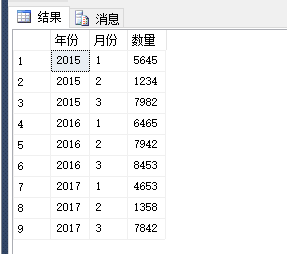
下面来实现一些需求:
需求一,按年份分组,不同的月份为一列。
-- 按年份分组,不同的月份为一列 select t.年份, sum(case t.月份 when '1' then t.数量 end) '1月份', sum(case t.月份 when '2' then t.数量 end) '2月份', sum(case t.月份 when '3' then t.数量 end) '3月份' from #temp t group by t.年份
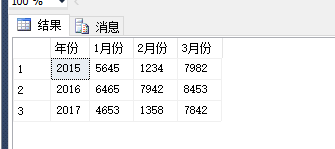
另外两种方法:
-- 使用左外连接查询 select t.年份,t1.数量 '1月份',t2.数量 '2月份',t3.数量 '3月份' from #temp t left join (select 年份,数量 from #temp where 月份='1') t1 on t.年份=t1.年份 left join (select 年份,数量 from #temp where 月份='2') t2 on t.年份=t2.年份 left join (select 年份,数量 from #temp where 月份='3') t3 on t.年份=t3.年份 group by t.年份,t1.数量,t2.数量,t3.数量 -- 使用自连接查询 select t.年份,t1.数量 '1月份',t2.数量 '2月份',t3.数量 '3月份' from #temp t, (select 年份,数量 from #temp where 月份='1') t1, (select 年份,数量 from #temp where 月份='2') t2, (select 年份,数量 from #temp where 月份='3') t3 where t.年份=t1.年份 and t.年份=t2.年份 and t.年份=t3.年份 group by t.年份,t1.数量,t2.数量,t3.数量
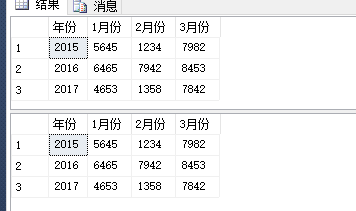
返回的结果都是一样的,可以看见这几种方法都是可以实现的(当然,可能还有更多的方法待发掘),不过比起第一种方法,后面这两种方法也太低效了吧,比如一年有12个月份的数据,有个七八年的,那得写多少个子查询、表连接的,而且第一种方法也不是我们想要的。那么就需要用到 Pivot 这种方法了。
Pivot 语法:
table_source -- 表名称,即数据源 PIVOT( 聚合函数(value_column) -- value_column 要转换为 列值 的列名 FOR pivot_column -- pivot_column 指定要转换的列 IN(<column_list>) -- column_list 自定义的目标列名 )
因为这里列名不允许指定为数字,真是无语。。。我重建了一个数据结构一模一样的表。
create table #temp ( Name nvarchar(10) null, Course nvarchar(10) null, Score int null ) insert into #temp(Name,Course,Score) select '小李','语文','88' union select '小李','数学','79' union select '小李','英语','85' union select '小明','语文','79' union select '小明','数学','89' union select '小明','英语','87' union select '小红','语文','84' union select '小红','数学','76' union select '小红','英语','92' select * from #temp go
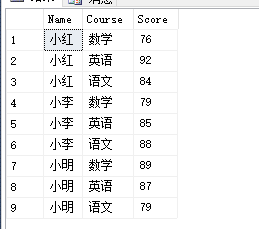
select Name 姓名, max(case Course when '语文' then Score end) 语文, max(case Course when '数学' then Score end) 数学, max(case Course when '英语' then Score end) 英语, sum(Score) 课程总分, cast(avg(Score) as decimal(18,2)) 课程平均分 from #temp group by Name
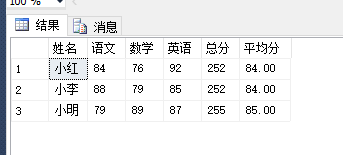
使用 Pivot 进行 行转列:
select a.Name 姓名,a.语文,a.数学,a.英语 from #temp pivot ( max(Score) -- 指定作为转换的列的值 的列名 for Course -- 指定要转换的列的列名 in(语文,数学,英语) -- 自定义的目标列名,即要转换列的不同的值作为列 )
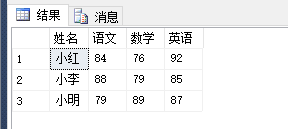
select a.Name 姓名,a.语文,a.数学,a.英语,b.SumScore 课程总分,b.AvgScore 课程平均分 from #temp pivot ( max(Score) -- 指定作为转换的列的值 的列名 for Course -- 指定要转换的列的列名 in(语文,数学,英语) -- 自定义的目标列名,即要转换列的不同的值作为列 )a, ( select t.Name,sum(t.Score) SumScore,cast(avg(t.Score) as decimal(18,2)) AvgScore from #temp t group by t.Name )b where a.Name=b.Name

UnPivot 语法:
table_source -- 表名称,即数据源 UNPIVOT( value_column -- value_column 要转换为 行值 的列名 FOR pivot_column -- pivot_column 指定要转换为指定的列 IN(<column_list>) -- column_list 目标列名 )
create table #temp ( Name nvarchar(10) null, Chinese int null, Math int null, English int null ) insert into #temp(Name,Chinese,Math,English) select '小李','88','79','85' union select '小明','79','89','87' union select '小红','84','76','92' select * from #temp go
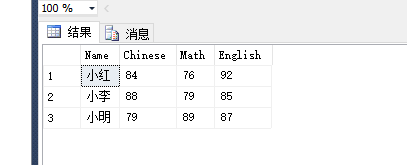
select t.Name 姓名,t.Course 课程,t.Score 分数 from (select t.Name,Course='Chinese',Score=Chinese from #temp t union all select t.Name,Course='Math',Score=Math from #temp t union all select t.Name,Course='English',Score=English from #temp t) t order by t.Name,t.Course
select t.Name 姓名,t.Course 课程,t.Score 分数 from (select t.Name,'Chinese' Course,Chinese Score from #temp t union all select t.Name,'Math',Math from #temp t union all select t.Name,'English',English from #temp t) t order by t.Name,t.Course

使用 UnPivot 进行 列转行:
select t.Name 姓名,t.Course 课程,t.Score 分数 from #temp unpivot ( Score for Course in(Chinese,Math,English) )
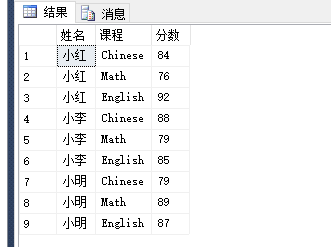
以上就是关于“SQL Server中怎么使用Pivot和UnPivot实现行列转换”这篇文章的内容,相信大家都有了一定的了解,希望小编分享的内容对大家有帮助,若想了解更多相关的知识内容,请关注亿速云行业资讯频道。
免责声明:本站发布的内容(图片、视频和文字)以原创、转载和分享为主,文章观点不代表本网站立场,如果涉及侵权请联系站长邮箱:is@yisu.com进行举报,并提供相关证据,一经查实,将立刻删除涉嫌侵权内容。